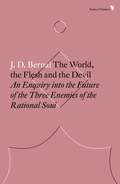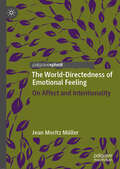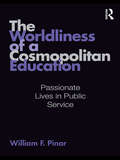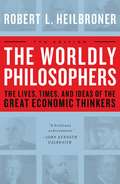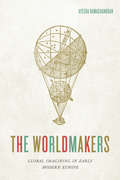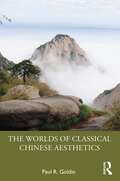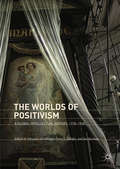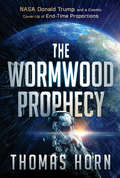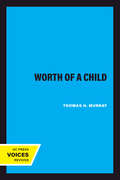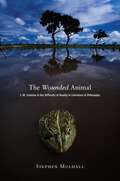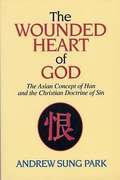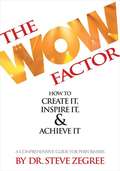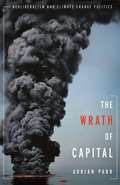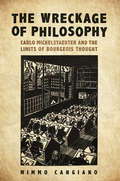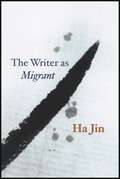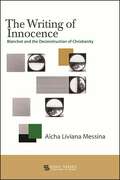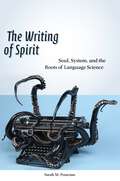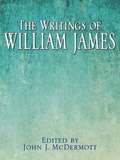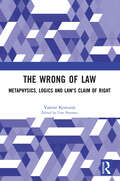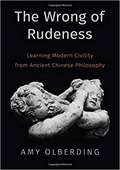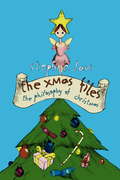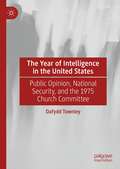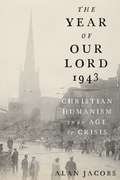- Table View
- List View
The World, the Flesh and the Devil: An Enquiry into the Future of the Three Enemies of the Rational Soul
by J. D. BernalA pioneering book proposing a transhumanist vision of the future, from one of the most influential visionary scientists of the twentieth century.
The World-Directedness of Emotional Feeling: On Affect and Intentionality
by Jean Moritz MüllerThis book engages with what are widely recognized as the two core dimensions of emotion. When we are afraid, glad or disappointed, we feel a certain way; moreover, our emotion is intentional or directed at something: we are afraid of something, glad or disappointed about something. Connecting with a vital strand of recent philosophical thinking, Müller conceives of these two aspects of emotion as unified. Examining different possible ways of developing the view that the feeling dimension of emotion is itself intentional, he argues against the currently popular view that it is a form of perception-like receptivity to value. Müller instead proposes that emotional feeling is a specific type of response to value, an affective ‘position-taking’. This alternative conceives of emotional feeling as intimately related to our cares and concerns. While situating itself within the analytic-philosophical debate on emotion, the discussion crucially draws on ideas from the early phenomenological tradition and thinks past the theoretical strictures of many contemporary approaches to this subject. The result is an innovative view of emotional feeling as a thoroughly personal form of engagement with value.
The World-Time Parallel: Tense and Modality in Logic and Metaphysics
by A. A. Rini M. J CresswellIs what could have happened but never did as real as what did happen? What did happen, but isn't happening now, happened at another time. Analogously, one can say that what could have happened happens in another possible world. Whatever their views about the reality of such things as possible worlds, philosophers need to take this analogy seriously. Adriane Rini and Max Cresswell exhibit, in an easy step-by-step manner, the logical structure of temporal and modal discourse, and show that every temporal construction has an exact parallel that requires a language that can refer to worlds, and vice versa. They make precise, in a way which can be articulated and tested, the claim that the parallel is at work behind even ordinary talk about time and modality. The book gives metaphysicians a sturdy framework for the investigation of time and modality – one that does not presuppose any particular metaphysical view.
The Worldliness of a Cosmopolitan Education: Passionate Lives in Public Service (Studies in Curriculum Theory Series)
by William PinarPinar positions himself against three pressing problems of the profession: the crime of collectivism that identity politics commits, the devaluation of academic knowledge by the programmatic preoccupations of teacher education, and the effacement of educational experience by standardized testing. A cosmopolitan curriculum, Pinar argues, juxtaposes the abstract and the concrete, the collective and the individual: history and biography, politics and art, public service and private passion. Such a curriculum provides passages between the subjective and the social, and in so doing, engenders that worldliness a cosmopolitan education invites. Such worldliness is vividly discernible in the lives of three heroic individuals: Jane Addams (1860-1935), Laura Bragg (1881-1978), and Pier Paolo Pasolini (1922-1975). What these disparate individuals demonstrate is the centrality of subjectivity in the cultivation of cosmopolitanism. Subjectivity takes form in the world, and the world is itself reconstructed by subjectivity’s engagement with it. In this intriguing, thought-provoking, and nuanced work, Pinar outlines a cosmopolitan curriculum focused on passionate lives in public service, providing one set of answers to how the field accepts and attends to the inextricably interwoven relations among intellectual rigor, scholarly erudition, and intense but variegated engagement with the world.
The Worldly Philosophers
by Robert L. HeilbronerThe Worldly Philosophers is a bestselling classic that not only enables us to see more deeply into our history but helps us better understand our own times. In this seventh edition, Robert L. Heilbroner provides a new theme that connects thinkers as diverse as Adam Smith and Karl Marx. The theme is the common focus of their highly varied ideas -- namely, the search to understand how a capitalist society works. It is a focus never more needed than in this age of confusing economic headlines. In a bold new concluding chapter entitled "The End of the Worldly Philosophy?" Heilbroner reminds us that the word "end" refers to both the purpose and limits of economics. This chapter conveys a concern that today's increasingly "scientific" economics may overlook fundamental social and political issues that are central to economics. Thus, unlike its predecessors, this new edition provides not just an indispensable illumination of our past but a call to action for our future.
The Worldmakers: Global Imagining in Early Modern Europe
by Ayesha RamachandranIn this beautifully conceived book, Ayesha Ramachandran reconstructs the imaginative struggles of early modern artists, philosophers, and writers to make sense of something that we take for granted: the world, imagined as a whole. Once a new, exciting, and frightening concept, "the world" was transformed in the sixteenth and seventeenth centuries. But how could one envision something that no one had ever seen in its totality? The Worldmakers moves beyond histories of globalization to explore how "the world" itself--variously understood as an object of inquiry, a comprehensive category, and a system of order--was self-consciously shaped by human agents. Gathering an international cast of characters, from Dutch cartographers and French philosophers to Portuguese and English poets, Ramachandran describes a history of firsts: the first world atlas, the first global epic, the first modern attempt to develop a systematic natural philosophy--all part of an effort by early modern thinkers to capture "the world" on the page.
The Worlds of Classical Chinese Aesthetics
by Paul R. GoldinThis book presents the foundations of classical Chinese aesthetic discourse - roughly from the Bronze Age to the early Middle Ages - with the following animating questions:What is art?Why do we produce it?How do we judge it?The arts that garnered the most theoretical attention during this time period were music, poetry, calligraphy, and painting, and this book considers the reasons why these four were privileged. Whereas modern artists most likely consider themselves musicians or poets or calligraphers or painters or sculptors or architects, the pre-modern authors who produced the literature that established Chinese aesthetics prided themselves on being wenren, “cultured people,” conversant with all forms of art and learning. Other comparisons with Western theories and works of art are presented at due junctures.Key Features Addresses Chinese aesthetic discourse on its own terms Provides comparisons of key concepts and theories with examples from Western sources Includes more coverage of primary sources than any other English-language book on the subject Each chapter opens with a helpful summary, highlighting the chapter’s key themes
The Worlds of Positivism: A Global Intellectual History, 1770-1930
by Jan Surman Johannes Feichtinger Franz L. FillaferThis book is the first to trace the origins and significance of positivism on a global scale. Taking their cues from Auguste Comte and John Stuart Mill, positivists pioneered a universal, experience-based culture of scientific inquiry for studying nature and society--a new science that would enlighten all of humankind. Positivists envisaged one world united by science, but their efforts spawned many. Uncovering these worlds of positivism, the volume ranges from India, the Ottoman Empire, and the Iberian Peninsula to Central Europe, Russia, and Brazil, examining positivism's impact as one of the most far-reaching intellectual movements of the modern world. Positivists reinvented science, claiming it to be distinct from and superior to the humanities. They predicated political governance on their refashioned science of society, and as political activists, they sought and often failed to reconcile their universalism with the values of multiculturalism. Providing a genealogy of scientific governance that is sorely needed in an age of post-truth politics, this volume breaks new ground in the fields of intellectual and global history, the history of science, and philosophy.
The Wormwood Prophecy: NASA, Donald Trump, and a Cosmic Cover-up of End-Time Proportions
by Thomas HornDoes the Bible predict an asteroid…or something else? This book will challenge your interpretation of end-times theology and help you sharpen your understanding in light of current times. Does Revelation 8:10–11 describe an asteroid? Is the Wormwood star from Revelation 8 already headed toward Earth? Are NASA and high-level government officials aware of an asteroid that is on a collision course with our planet? Is that why President Trump sanctioned a colossal increase to planetary defense? Do the prophecies from ancient cultures and religions across the globe all point to a catastrophic planetary event that has scientists and politicians taking extreme preventative measures under the public radar? Earth is not currently prepared for the scope of impact that may be just around the corner, and people in high places know it… But what will the biblical Wormwood actually be? Traditional scholarly interpretation claims it will be an asteroid. Others postulate that the eschatological poisoning of one-third of all Earth's waters and the devastation of our planet's ecology might not be as detectable as we may believe: it could hit suddenly and without warning, like an angel of God appearing in the sky with fire and light, bringing judgment in an instant. Follow Thomas Horn as he blazes a trail through these questions and many others, posing answers that very few in the church today are willing to provide.FEATURES AND BENEFITS:Examines asteroid threats to Earth, including Apophis (named after the Egyptian god of chaos), which is a topic of serious discussion among experts in planetary defenseIncludes interviews with government impact specialists, scientists, Bible scholars, and prophecy experts
The Worth of a Child
by Thomas H. MurrayThomas Murray's graceful and humane book illuminates one of the most morally complex areas of everyday life: the relationship between parents and children. What do children mean to their parents, and how far do parental obligations go? What, from the beginning of life to its end, is the worth of a child?Ethicist Murray leaves the rarefied air of abstract moral philosophy in order to reflect on the moral perplexities of ordinary life and ordinary people. Observing that abstract moral terms such as altruism and selfishness can be buried in the everyday doings of families, he maintains that ethical theory needs a richer description than it now has of the moral life of parents and children. How far should adults go in their quest for children? What options are available to women who do not want to bear a child now? Should couples be allowed to reject a child because of genetic disability or "wrong" gender? How can we weigh the competing claims of the genetic and the rearing parents to a particular child?The Worth of a Child couples impressive learning with a conversational style. Only by getting down to cases, Murray insists, can we reach moral conclusions that are unsentimental, farsighted, and just. In an era of intense public and private acrimony about the place and meaning of "family values," his practical wisdom about extraordinary difficult moral issues offers compelling reading for both experienced and prospective parents, as well as for ethicists, social and behavioral scientists, and legal theorists.
The Wounded Animal: J. M. Coetzee and the Difficulty of Reality in Literature and Philosophy
by Stephen MulhallIn 1997, the Nobel Prize-winning novelist J. M. Coetzee, invited to Princeton University to lecture on the moral status of animals, read a work of fiction about an eminent novelist, Elizabeth Costello, invited to lecture on the moral status of animals at an American college. Coetzee's lectures were published in 1999 as The Lives of Animals, and reappeared in 2003 as part of his novel Elizabeth Costello; and both lectures and novel have attracted the critical attention of a number of influential philosophers--including Peter Singer, Cora Diamond, Stanley Cavell, and John McDowell. In The Wounded Animal, Stephen Mulhall closely examines Coetzee's writings about Costello, and the ways in which philosophers have responded to them, focusing in particular on their powerful presentation of both literature and philosophy as seeking, and failing, to represent reality--in part because of reality's resistance to such projects of understanding, but also because of philosophy's unwillingness to learn from literature how best to acknowledge that resistance. In so doing, Mulhall is led to consider the relations among reason, language, and the imagination, as well as more specific ethical issues concerning the moral status of animals, the meaning of mortality, the nature of evil, and the demands of religion. The ancient quarrel between philosophy and literature here displays undiminished vigor and renewed significance.
The Wounded Heart of God
by Andrew S. ParkPark asserts that one cannot grasp the full meaning of the sin and guilt of sinners until one has looked at the Korean concept of han--the relational consequence of sin--and shame of their victims. To reconcile with God and with other humans, one's sin must be repented, guilt must be forgiven, the han of those who have been wronged must be healed, and the shame which results from that wrong must be erased.
The Wow Factor: A Comprehensive Guide for Performers
by Steve ZegreeDr. Steve Zegree of Western Michigan University, choral arranger and conductor of Western Michigan's Gold Company has developed this practical guide for performers, students, teachers and parents which offers fundamental philosophies and concepts that are essential to a person's growth and development and will contribute to a successful professional life in music.
The Wrath of Capital: Neoliberalism and Climate Change Politics (New Directions in Critical Theory #48)
by Adrian ParrAlthough climate change has become the dominant concern of the twenty-first century, global powers refuse to implement the changes necessary to reverse these trends. Instead, they have neoliberalized nature and climate change politics and discourse, and there are indications of a more virulent strain of capital accumulation on the horizon. Adrian Parr calls attention to the problematic socioeconomic conditions of neoliberal capitalism underpinning the world's environmental challenges, and she argues that, until we grasp the implications of neoliberalism's interference in climate change talks and policy, humanity is on track to an irreversible crisis.Parr not only exposes the global failure to produce equitable political options for environmental regulation, but she also breaks down the dominant political paradigms hindering the discovery of viable alternatives. She highlights the neoliberalization of nature in the development of green technologies, land use, dietary habits, reproductive practices, consumption patterns, design strategies, and media. She dismisses the notion that the free market can solve debilitating environmental degradation and climate change as nothing more than a political ghost emptied of its collective aspirations. Decrying what she perceives as a failure of the human imagination and an impoverishment of political institutions, Parr ruminates on the nature of change and existence in the absence of a future. The sustainability movement, she contends, must engage more aggressively with the logic and cultural manifestations of consumer economics to take hold of a more transformative politics. If the economically powerful continue to monopolize the meaning of environmental change, she warns, new and more promising collective solutions will fail to take root.
The Wreckage of Philosophy: Carlo Michelstaedter and the Limits of Bourgeois Thought (Toronto Italian Studies)
by Mimmo CangianoThe work of Carlo Michelstaedter (1887–1910) was the first to analyze modernist philosophy in strict connection with social changes in mass society. Revealing how Michelstaedter was able to unveil the relations between pivotal early-modernist philosophies and social restructurings, The Wreckage of Philosophy examines the ongoing processes of "specialization," "rationalization," and "atomization." It points out how Michelstaedter connected the main theoretical expressions of modernism with the decisive social transformations of the early twentieth century, taking into consideration the key players of modernist philosophy, such as Friedrich Nietzsche, Henri Bergson, Ernst Mach, and William James. By following Michelstaedter’s analysis and strategies, The Wreckage of Philosophy focuses on several intertwined issues: the distinct philosophical positions within the modernist area; the connections between philosophy and modernist literature; the relations between intellectual positions and social upheavals; and the early-twentieth-century links among traditional philosophy, critique of language, and epistemology of technique.
The Writer as Migrant
by Ha JinHa Jin's journey from an uneducated soldier in the People's Liberation Army in China to a resident of the United States raises questions about language, migration, and the place of literature in a globalizing world.
The Writing of Innocence: Blanchot and the Deconstruction of Christianity (SUNY series, Literature . . . in Theory)
by Aïcha Liviana MessinaThe Writing of Innocence explores the topic of innocence and the peculiar relationship to Christianity in the writing of Maurice Blanchot. Its starting point is that innocence is not a condition relegated to a mythical past but rather one resulting from the construction of the subject in and through language. Hence, we don't lose innocence; instead, we are lost by innocence. It is an excess, not a lack. This inverted notion of innocence raises new ethical and political issues that Aïcha Liviana Messina unfolds through vigorous re-readings of a series of biblical motifs, including law, grace, and apocalypse. The closing chapter turns to the convergences and divergences between Jean-Luc Nancy's and Blanchot's understandings of the deconstruction of Christianity. With a foreword by philosopher Serge Margel, The Writing of Innocence offers a fresh perspective on Blanchot's writings in general and on his dialogue with Hegel in particular. While staging innocence in its philosophical and literary dimensions, The Writing of Innocence provides singular readings of works by Kierkegaard, Agamben, Derrida, Nancy, Camus, Hugo, and Kafka.
The Writing of Spirit: Soul, System, and the Roots of Language Science
by Sarah M. PourciauContemporary thought has been profoundly shaped by the early-twentieth-century turn toward synchronic models of explanation, which analyze phenomena as they appear at a single moment, rather than diachronically as they develop through time. But the relationship between time and system remains unexplained by the standard account of this shift. Through a new history of systematic thinking across the humanities and sciences, The Writing of Spirit argues that nineteenth-century historicism wasn’t simply replaced by a more modern synchronic perspective. The structuralist revolution consisted rather in a turn toward time’s absolutely minimal conditions, and thus also toward a new theory of diachrony.Pourciau arrives at this surprising and powerful conclusion through an analysis of language-scientific theories over the course of two centuries, associated with thinkers from Jacob Grimm and Richard Wagner to the Russian Futurists, in domains as disparate as historical linguistics, phonology, acoustics, opera theory, philosophy, poetics, and psychology. The result is a novel contribution to a pressing contemporary question—namely, what role history should play in the interpretation of the present.
The Writings of William James
by John J. McdermottA Modern Library collection of writings by the American psychologist, philosopher, and writer William James. His writings touch on themes of psychology, religion, free will, and pragmatism.
The Wrong of Law: Metaphysics, Logics and Law's Claim of Right
by Valerie KerruishThis book combines metaphysics, aspects of modern logic, and legal theory in order to conceptualise a wrong in law’s claim of right.The book takes as its starting point a restriction on the freedom of concept formation that is dictated by classical logic’s inability to handle antinomies in reason’s attempts to constitute its own foundations. Relating this to law’s claim of right, the notion of ‘wrong’ does not fasten on law’s violence or injustice, and neither does it seek to elaborate a moral or ethical critique of law. On the contrary: it is sceptical of, and seeks an alternative to, the various ethical turns of recent legal and political theory. The ‘wrong’ of the wrong of law is logical and epistemic in character. It is a failure or refusal to recognise the cognitive relevance of contradictions of self-reference. In this respect, The Wrong of Law draws on a metaphysical-logical development from Kant via Hegel and Marx to the foundations of modern logic, in order to establish the sense in which a restriction on self-reference amounts to a limitation on truth-seeking or comprehension. This limitation is then demonstrated through analysis of the reasoning in a series of legal cases in Australia, concerning Indigenous peoples.This book will be of significant interest to scholars in critical legal theory, the philosophy of law and jurisprudence; as well as others with an interest in foundational studies across the disciplinary borders of metaphysics, mathematical logic, sociology and legal theory.
The Wrong of Rudeness: Learning Modern Civility from Ancient Chinese Philosophy
by Amy OlberdingIn a time of fractious politics, being rude can feel wickedly gratifying, while being polite can feel simple-minded or willfully naïve. Do manners and civility even matter now? Is it worthwhile to make the effort to be polite? When rudeness has become routine and commonplace, why bother? When so much of public and social life with others is painful and bitterly acrimonious, why should anyone be polite? <p><p> As Amy Olberding argues, civility and ordinary politeness are linked both to big values, such as respect and consideration, and to the fundamentally social nature of human beings. Being polite is not just a nicety--it has deep meaning. Olberding explores the often overwhelming temptations to incivility and rudeness, and the ways that they must and can be resisted. <p><p> Drawing on the wisdom of early Chinese philosophers who lived through great political turmoil but nonetheless avidly sought to "mind their manners," the book articulates a way of thinking about politeness that is distinctively social. We can feel profoundly alienated from others, and others can sometimes be truly terrible, yet, as the Confucian philosophers encourage us to see, because we are social, neglecting the social and political courtesies comes at perilous cost. <p><p> The book considers not simply why civility and politeness are important, but how. It reveals how small insults can accumulate to damage social relations, how separating people into tribes undermines our better interests, and how even bodily and facial expressions can influence our lives with others. Many of us, in spite of our best efforts, are often tempted to be rude, and will find here tools for fighting that temptation.
The Xmas Files: The Philosophy Of Christmas
by Stephen LawA philosophical but fun look at the meanings of Christmas myths and rituals, from carving the turkey to why Santa wears red.Picture the scene: Aunt Gertrude has just given you the most appalling Christmas tie, complete with snow-flecked kittens in a bowler hat. Do you smile, nod, and confine it to the bottom drawer? Or do you tell the truth and spare yourself future ties from hell? Kant would say that we must, at all costs, tell the truth - whilst Mill would insist that we should think of the consequences. THE XMAS FILES is a philosophical meander though the myths and rituals of Christmas today, asking such important questions as does Santa exist? What's wrong with Christmas kitsch? Is it all just a commercial racket? What was Augustine's attitude to 'peace on earth'? And what would David Hume have to say about the virgin birth? For underneath all the festive fun, the way we celebrate Christmas does raise serious questions about the beliefs that sustain us, and the ways in which we still value ritual and tradition as a means of coming together.
The Xmas Files: The Philosophy of Christmas
by Stephen LawA philosophical but fun look at the meanings of Christmas myths and rituals, from carving the turkey to why Santa wears red.Picture the scene: Aunt Gertrude has just given you the most appalling Christmas tie, complete with snow-flecked kittens in a bowler hat. Do you smile, nod, and confine it to the bottom drawer? Or do you tell the truth and spare yourself future ties from hell? Kant would say that we must, at all costs, tell the truth - whilst Mill would insist that we should think of the consequences. THE XMAS FILES is a philosophical meander though the myths and rituals of Christmas today, asking such important questions as does Santa exist? What's wrong with Christmas kitsch? Is it all just a commercial racket? What was Augustine's attitude to 'peace on earth'? And what would David Hume have to say about the virgin birth? For underneath all the festive fun, the way we celebrate Christmas does raise serious questions about the beliefs that sustain us, and the ways in which we still value ritual and tradition as a means of coming together.
The Year of Intelligence in the United States: Public Opinion, National Security, and the 1975 Church Committee
by Dafydd TownleyThis book will offer a unique approach to the Year of Intelligence, the sixteen-month period between January 1975 and April 1976 that saw the innermost secrets of various US intelligence agencies laid bare before the world. After allegations of intelligence abuses were made in the press, Congress investigated and revealed numerous cases of unwarranted and unconstitutional activity conducted by a number of intelligence agencies. Chief among the investigations was the Senate enquiry, popularly known as the Church Committee after its chairman, Senator Frank Church of Idaho. This study’s objective is to examine the relationship between national security policy and public opinion using extensive archival evidence, including previously unidentified indicators of public opinion. This monograph makes an important contribution to the historiography of the Church Committee, of public opinion, and of national security policy. The research contributes to the debate on the effectiveness of the Church Committee by challenging the conclusions within the established historiography of the limited impact of the committee’s quest for reform. Furthermore, it widens the very limited scholarship that engages with public opinion’s effect on national security policy. And the project also indicates to policymakers the lessons that can be learnt from the case study, principally, that public opinion is a vital ingredient in the decision making process of successful national security policy.
The Year of Our Lord 1943: Christian Humanism in an Age of Crisis
by Alan JacobsAlan Jacobs explores the poems, novels, essays, reviews, and lectures of these five central figures, in which they presented, with great imaginative energy and force, pictures of the very different paths now set before the Western democracies. Working mostly separately and in ignorance of one another's ideas, the five developed a strikingly consistent argument that the only means by which democratic societies could be prepared for their world-wide economic and political dominance was through a renewal of education that was grounded in a Christian understanding of the power and limitations of human beings. The Year of Our Lord 1943 is the first book to weave together the ideas of these five intellectuals and shows why, in a time of unprecedented total war, they all thought it vital to restore Christianity to a leading role in the renewal of the Western democracies.
